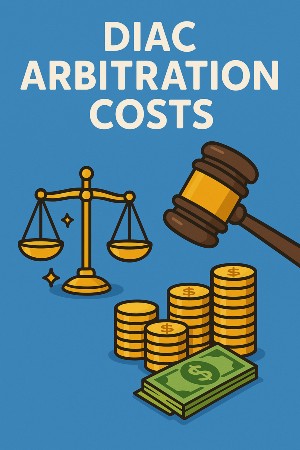Before commencing arbitration before the Dubai International Arbitration Centre (“DIAC”), parties often ask what costs they should expect.
A DIAC arbitration typically involves the following heads of costs: (1.) the DIAC’s administrative fees, including a registration fee, (2.) the tribunal’s fees, (3.) legal fees, (4.) expert fees (if any), and (5.) hearing costs.
Certain costs are governed by the 2025 DIAC Table of Fees and Costs and the 2022 DIAC Arbitration Rules currently in force.
Most costs are recoverable from the losing party, subject to any agreement of the parties and the tribunal’s discretion.
A table of standard DIAC arbitration costs can be downloaded here.
 Main Heads of Costs in DIAC Arbitrations
Main Heads of Costs in DIAC Arbitrations
- DIAC’s Administrative Fees: DIAC charges a non-refundable registration fee, currently set at USD 3,000, for initiating arbitration (as a claimant) and for introducing a counterclaim (as a respondent). DIAC also charges administrative fees based on the total amount in dispute, which is the aggregate value of all claims, counterclaims and setoffs. DIAC’s fee schedule is tiered, with fixed and percentage-based components. For example, for a USD 2 million dispute, DIAC would charge USD 29,250 (that is, USD 23,000, plus 0.625% of the amount above 1 million). DIAC may also charge for reasonable expenses, such as shipping costs.
- Tribunal’s Fees: The tribunal’s fees are also determined based on the total amount in dispute, with minimum and maximum ranges, as set out in the 2025 DIAC Table of Fees and Costs. For a USD 2 million dispute, for instance, the fee for each arbitrator (normally one or three) would range from USD 28,000 to USD 75,920. The tribunal may also have reasonable expenses, such as travel and hotel accommodation to attend a physical hearing.
- Legal Costs: Legal fees generally represent the largest cost component. These include lawyer fees and reasonable disbursements, such as shipping, travel and accommodation. Successful parties often seek to recover legal fees, but reimbursement depends on the tribunal’s discretion and the reasonableness of the amounts claimed.
- Expert Costs: Expert fees refer to the costs of engaging technical, financial, or legal experts to provide expert reports (and usually oral testimony at the final hearing) on matters in dispute. While experts are not always necessary, their involvement can be crucial in complex cases, such as delay experts in construction cases, and their fees can be significant. Expert costs are initially borne by the party appointing the expert, but they are generally recoverable from the losing party, provided they are reasonable.
- Hearing Costs: Hearing costs include expenses associated with conducting the final arbitration hearing, such as venue rental, transcription services, interpretation, audiovisual equipment, and any related logistical arrangements. These costs can vary depending on the type (virtual, physical, or hybrid), length, and complexity of the hearing. Hearing expenses are usually advanced by the parties in equal share and, like other arbitration costs, are typically recoverable from the losing party to the extent that they are reasonable.
DIAC Payment Procedure
- Advances on costs: Once a case is registered, DIAC fixes an advance on costs to cover the DIAC’s and the tribunal’s fees and expenses, calculated by reference to the total sum claimed and counterclaimed. This advance is payable in equal shares by the claimant(s) and the respondent(s).
- Failure to pay advances on costs: If a party fails to pay its share of the advance on costs, the other party is normally ordered to cover it. If the advance is not paid within a final time limit set by the DIAC Court, the relevant claim or counterclaim is considered withdrawn. Payments made by one party on behalf of another may be recoverable, including by an award on costs.
- Cost allocation: DIAC’s approach to cost allocation is flexible and rooted in tribunal discretion. While the DIAC Rules do not prescribe a strict “costs follow the event” rule as for the LCIA, the tribunal has broad discretion to allocate costs, taking into account the circumstances of the case and party conduct. The tribunal may also issue interim or partial awards on costs.
- Reimbursement of any remaining funds: Any unused portion of the advance on costs is returned to the parties at the end of the arbitration.
Cost-Reduction Tips for Parties Considering DIAC Arbitration
Parties considering DIAC arbitration should budget early and carefully estimate the amount in dispute, as DIAC and tribunal fees are directly tied to it. Early planning helps avoid unexpected financial pressure. Timely payment of the DIAC’s advances on costs is also essential, since non-payment can lead to the withdrawal of claims or counterclaims and cause significant procedural delays.
Effective early case assessment, identifying the strengths, weaknesses, and evidentiary needs of the case at the outset, helps parties make informed decisions about settlement opportunities, narrowing the issues, or tailoring the procedure to what is genuinely required, all of which contribute to a more cost-efficient arbitration process. Opting for virtual hearings also avoids travel, accommodation and venue hire expenses.
Choosing cost-effective and experienced counsel is equally important, as legal fees are typically the largest cost component in a DIAC arbitration. When allocating costs, tribunals assess both the reasonableness of the legal fees incurred and the parties’ conduct throughout the proceedings. Engaging counsel with competitive rates and the expertise to run the arbitration efficiently, therefore, increases the likelihood that these fees will be recovered from the opposing party. Parties who comply promptly with tribunal directions, avoid unnecessary procedural disputes, and focus on the core issues typically keep costs lower and are viewed more favourably when costs are allocated.
Conclusion
Understanding DIAC’s cost structure helps parties plan effectively and avoid unexpected financial issues. Clients are encouraged to seek tailored advice from experienced counsel, such as Aceris Law, to navigate the cost landscape and maximize efficiency in their arbitration proceedings.